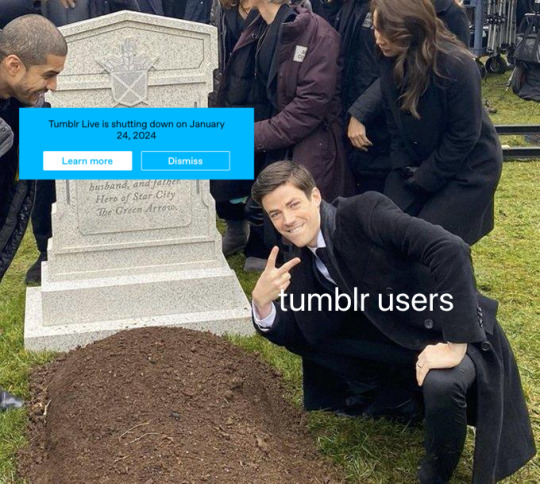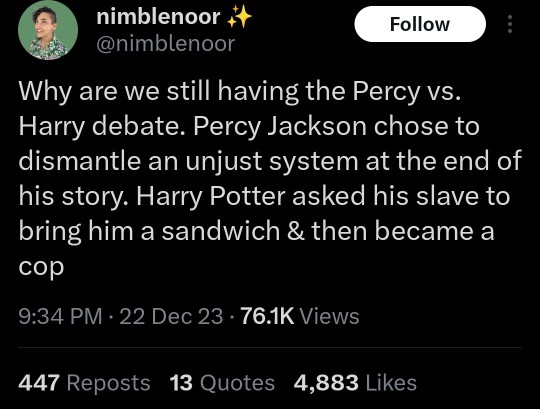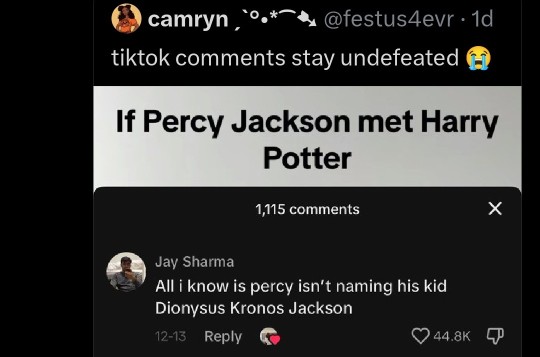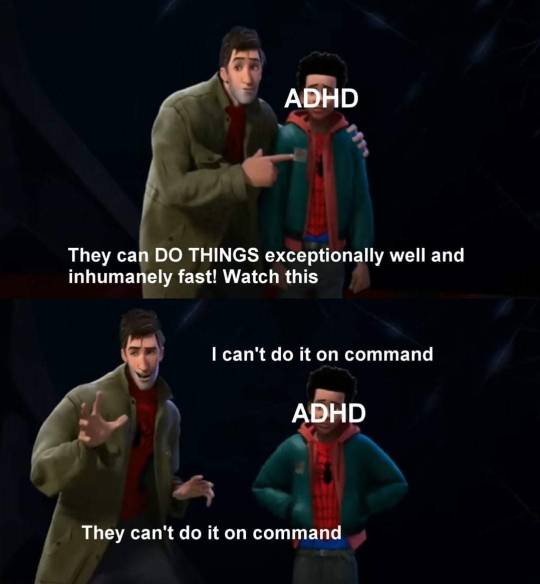Trying to focus on writing books. Failing by being here.
Don't wanna be here? Send us removal request.
Text
Ten Websites Every Author Should Know In 2024

When I started this blog, one of the first posts I penned was "Websites Every Author Should Know in 2023." Now, as I return to breathe new life into this platform in 2024, it feels only fitting to offer an updated edition of that beloved post.
Whether you're struggling with brainstorming ideas, organizing your plot, finding publishing opportunities, or simply seeking some writing motivation, here are 10 websites that every author should know in 2024.
1. Artbreeder
If you're anything like me, you know the frustration of staring at a blank page, waiting for inspiration to strike. Well, say goodbye to writer's block because Artbreeder is here to rescue you from the depths of creative stagnation.
At its core, Artbreeder is a brainstorming tool that harnesses the power of artificial intelligence to help you generate ideas and explore new avenues of creativity. Whether you're crafting characters, creating scene locations, or conceptualizing entire worlds, Artbreeder's AI can help you create any image.
But don't just take my word for it. Countless writers, from aspiring novices to seasoned pros, have sung the praises of Artbreeder for its role in fueling their creative fire.
2. OneStopForWriters
If you've ever found yourself drowning in a sea of character arcs, struggling to untangle a convoluted plot, or simply searching for that elusive spark of inspiration, then OneStopForWriters is here to be your guiding light.
At OneStopForWriters, you'll find a treasure trove of resources designed to empower writers at every stage of their journey. One of the standout features is its unparalleled collection of writing tools and resources. From character development worksheets and plot structure guides to brainstorming prompts and writing exercises, this platform offers a wealth of resources to help you hone your craft and overcome any writing challenge that comes your way.
3. Milanote
With Milanote, organizing your thoughts has never been easier. Whether you're plotting out your next novel, storyboarding a film, or brainstorming ideas for your next project, Milanote's intuitive interface and versatile features make it a breeze to bring your ideas to life.
But Milanote isn't just about organization – it's about inspiration, too. Dive into Milanote's vast collection of templates, images, and resources, curated to spark your creativity and fuel your passion for storytelling.
And let's not forget about collaboration. With Milanote, you can seamlessly collaborate with fellow writers, sharing ideas, giving feedback, and working together to bring your collective vision to life. Let me know if you'd like to collab!
4. Inkarnate
Whether you're a fantasy author crafting intricate realms, a sci-fi writer mapping out distant galaxies, or a historical fiction enthusiast recreating the past, Inkarnate is your ultimate tool for world-building.
With Inkarnate's powerful mapping tools and customizable features, creating stunning and detailed maps has never been easier. From sprawling continents to intricate cityscapes, Inkarnate allows you to bring every aspect of your world to life with breathtaking detail and precision.
But Inkarnate isn't just about maps – it's about storytelling. Dive into Inkarnate's vast library of assets, from characters and creatures to landmarks and landscapes, and use them to enrich your world and enhance your storytelling.
5. World Anvil
With World Anvil's array of interactive tools and features, you can meticulously craft every detail of your world, from its geography and history to its cultures and languages. Whether you're creating a sprawling fantasy realm, a dystopian future, or an alternate historical timeline, World Anvil provides the tools you need to breathe life into your creations.
But World Anvil is more than just a repository for world-building information. It's a platform for storytelling, collaboration, and engagement. Share your world with readers, invite them to explore its intricacies, and immerse them in the rich tapestry of your imagination
6. Scrivener
At its core, Scrivener is a comprehensive writing software designed to meet the unique needs of authors, screenwriters, academics, and more. With its flexible interface and robust features, Scrivener allows you to organize your thoughts, structure your writing, and bring your ideas to life with ease.
One of Scrivener's standout features is its ability to break down your writing into manageable chunks, or "scrivenings," making it easy to focus on individual scenes, chapters, or sections of your manuscript. With its intuitive corkboard and outlining tools, you can visualize your project's structure and rearrange it on the fly.
But Scrivener is more than just a writing tool – it's a creative hub where ideas flourish and projects take shape. With its built-in research capabilities, you can keep all your notes, references, and inspiration in one place, ensuring that nothing gets lost in the shuffle.
7. Dabble
One of Dabble's standout features is its seamless integration of plotting, outlining, and writing tools. Whether you're a die-hard plotter or a pantser at heart, Dabble has the flexibility to accommodate your preferred writing style, allowing you to create detailed outlines, jot down notes, and dive into writing whenever inspiration strikes.
But Dabble is more than just a writing tool – it's a community of writers united by their love of storytelling and their commitment to helping each other succeed. Here, you'll find support, encouragement, and invaluable feedback as you navigate the ups and downs of the writing process.
With Dabble's cloud-based platform, you can access your work from anywhere, on any device, ensuring that your novel is always at your fingertips, whether you're at home, at work, or on the go.
8. Literature Map
Literature Map is a visual mapping tool that helps you discover new authors and books based on your literary preferences. Whether you're a fan of classic literature, contemporary fiction, or niche genres, Literature Map provides personalized recommendations to help you expand your reading horizons.
Using Literature Map is as easy as typing in the name of an author you love. Instantly, a constellation of related authors appears, each connected by their thematic, stylistic, or genre similarities. From there, you can explore new authors, discover hidden gems, and embark on new reading adventures with confidence.
But Literature Map is more than just a recommendation engine – it's a gateway to a world of literary exploration and discovery. Here, you'll find a community of fellow book lovers, eager to share their favorite authors, discuss their latest reads, and connect with like-minded readers from around the globe.
That concludes our exploration of the 10 essential websites every author should know in 2024. May these tools and resources empower you on your writing journey, from the spark of inspiration to the final flourish of your manuscript. Happy writing, and may your creativity know no bounds!
I hope this blog on Ten Websites Every Author Should Know In 2024 will help you in your writing journey. Be sure to comment any tips of your own to help your fellow authors prosper, and follow my blog for new blog updates every Monday and Thursday.
Looking For More Writing Tips And Tricks?
Are you an author looking for writing tips and tricks to better your manuscript? Or do you want to learn about how to get a literary agent, get published and properly market your book? Consider checking out the rest of Haya’s book blog where I post writing and publishing tips for authors every Monday and Thursday! And don’t forget to head over to my TikTok and Instagram profiles @hayatheauthor to learn more about my WIP and writing journey!
89 notes
·
View notes
Text
Repeat after me:
The first draft just needs to exist
The second draft needs to be functional
The third draft needs to be effective
The first draft just needs to exist
The second draft needs to be functional
The third draft needs to be effective
The first draft just needs to exist
The second draft needs to be functional
The third draft needs to be effective
Remember, the second and third can't happen if you don't have something to work with. Your first draft will always be shit compared to your third, but at least it exists. The worst first draft is an unfinished one. The best first draft is a just completed one.
You read books/stories not in their first draft form-- only in their finished form (third, fourth, sometimes fifteenth draft). So stop comparing your first draft with a final one.
So, just write--you can make it better later. Perfectionism is the greatest weight a creator can carry.
7K notes
·
View notes
Text
Three tricks to avoid plot armour
Plot armour can be difficult to avoid. We get so attached to our characters that hurting them in any way feels like a betrayal.
But plot armour is detrimental to any good narrative. Having your characters avoid harm, whether that be emotional or physical, means that there aren't any stakes. And without stakes, it's difficult for readers to invest.
There are three simple things you can use to avoid plot armour:
🔵 Injury 🔵 Sacrifice 🔵 Consequence
In every conflict, make sure the resolution contains at least one of these things.
If you don't want to injure your characters, make sure that they sacrifice something, whether that be someone, or an object. If they don't sacrifice anything, make sure there is a consequence. That consequence can be a loss, an emotional wound, or simply a blow to their reputation. The important thing is that your character doesn't remain unscathed by their experience, and they walk out somehow changed.
2K notes
·
View notes
Text
repeat after me
I WILL FINISH MY WIP
I WILL FINISH MY WIP
I WILL FINISH MY WIP
14K notes
·
View notes
Text
sighs and resets the "Days Since A Reylo Who Turned Their Crappy Fanfic Into A Book Revealed Its Not Just Their Taste In Ships That's Insanely Racist" counter to zero
672 notes
·
View notes
Text
A full explanation of #reviewbombgate, a major scandal that broke on Booktwt this week.
Please support the books and authors impacted the most:
Kamilah Cole - So Let Them Burn
Bethany Baptiste - The Poisons We Drink
Molly X Chang - To Gaze Upon Wicked Gods
Frances White - Voyage of the Damned
KM Enright - Mistress of Lies
RM Virtues - the Gods of Hunger series
(PS. I know people love to jump to "YA authors are always acting up" and assume any author with a femme-sounding name writes YA so lemme say right now that this author writes adult sci-fi.)
26K notes
·
View notes
Text
All That Glitters is Not Feminism - An Analysis of LO's Brand of "Feminism" and What Remains of its Fanbase (The Twist)
Alright y'all, I've been waiting a hot minute to talk about this because I wanted to see how it fully panned out before saying anything about it. And it's not even specifically about LO, but I do think it's very adjacent to it in a way that I'm sure you'll be shocked to hear. Much of it speaks to how we prop up white writers even at the expense of POC.
This is 'the twist' attached to my first post that I made just a couple hours ago that concerns an entirely other topic but I feel ties into this subject very well.
If you haven't heard, there's this author who recently fucked around in the Del Rey publishing scene.
Her name is Cait Corrain.
In the original tweet calling this person out, names were not dropped, but it was made very clear that what Cait did was unacceptable behavior.
You can read the entire thread that started it all from Xiran here:
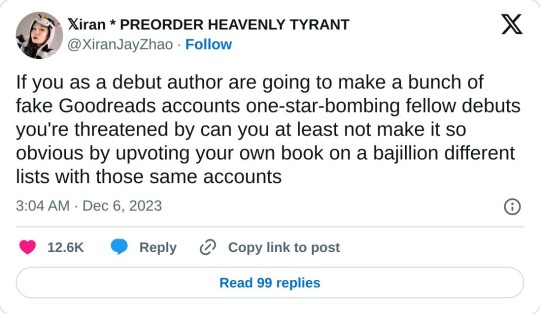
There's also a GREAT recap thread from one of the affected authors, Bethany Baptiste:

I want to make it clear that Cait Corrain isn't just a debut author.
Cait Corrain is - or now, was (foreshadowing is a literary device that-) - a debut author who had an agent, a publishing deal with Del Rey (an imprint of Random House which is a MAJOR publisher) and even an upcoming Illumicrate deal - meaning, her book was going to be packaged in a monthly loot crate subscription shipped directly to people's doors, quite possibly one of the best marketing deals a debut author could ever get, usually unheard of in this industry. All the pre-reviews were strong and positive.
Cait's book was literally set up for success. All she had to do was sit back, relax, and watch the fruits of her labors roll in. She had written the book. It was ready for release. The hard part was technically over.
But I guess the racism brainrot got to her because as it turns out, since April - for EIGHT MONTHS - she's been making alternate accounts on GoodReads to review bomb the indie and debut works of her friends and peers, most of whom were POC and did not have the same opportunities set up for them as she did. There are loads of receipts to back this up that you can find in those above threads ^^^
To say that this is appalling is an understatement. This was an intentional and deliberate act of racism by a white queer writer who claimed to be "jealous" - of what, I can't imagine - so much so that she deliberately sabotaged her peers, people who had supported her and her book.
And then when she got caught? She doubled down on it and claimed it was a "friend", also an alternate account she made up.
The exchange between her and this made-up person is actually the funniest shit out of this entire thing, it's so poorly written and as soon as people noticed the time stamps were out of order, that was when it truly cemented her newfound clown status.
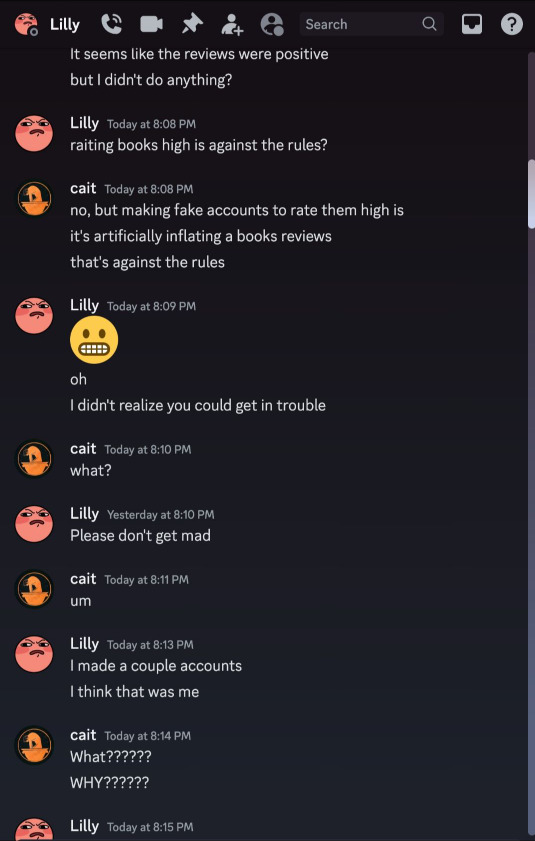
"oooooh he's standing right behind me, isn't he?" energy right here LMAO


yes keep expositing cait, that's really selling the "this is a genuine conversation that really happened with a real person" bit 🤡
Anyways, it became abundantly clear that Cait was just going to continue to dig her heels in over something she caused.
This has been a hot topic in the UnpopularLO Discord, not just because of how crazy of a situation it is that we had to talk about it - and we have people within the community who work in the literature and media sector - but because we noticed one very telling thing in the list of series that she had review bombed in her very own personal act of wrath.
You see, Cait made one fundamental mistake that led to her undoing - she didn't just review bomb the works of her peers, she positively reviewed her own book and others.
What's her book about though?
It's an Ariadne x Dionysus retelling set in space.
It's literally another "modern retelling" of Greek myth.
And wouldn't you know it, guess who else created a modern retelling of Greek myth that she included in her positive review raiding while she was sabotaging the work of her actual peers?

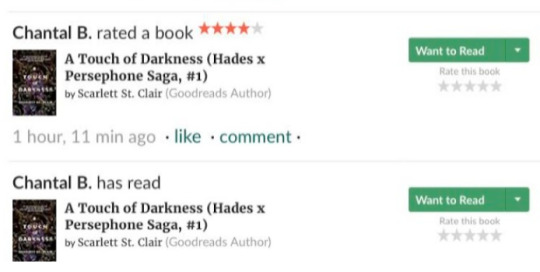

Now, I think it goes without saying that what I'm about to say should be taken with MOUNTAINS of salt, I'm sure a lot of you are reading the headline and going, "Ugh, really? You're gonna make this about LO? Could you give it a rest already???"
I need you to understand, with the current state of Rachel's fanbase and 'modern' Greek myth literature as a whole, at this point Lore Olympus - and the works that are literally inspired by it such as A Touch of Darkness - has basically become the shopping cart litmus test of basic decency. It's like when someone says they like Harry Potter - you can't take it automatically at good faith anymore, because there isn't a whole lot separating someone who simply liked Harry Potter as a kid and still rewatches the movies from time to time from someone who fully supports the politics and agenda of J.K. Rowling. No, not everyone who still watches the movies or reads the books fondly is a TERF by default, but it's justifiably a reason for suspicion when the consequences are often too dire to risk.
There's this thing that's been happening in the LO fanbase that I frankly saw coming, but has really recently started to hit its peak. It's what I call the "Kanye Effect", where the comic has become so absurd and backwards in its misogyny and white feminism that the only people who seem to be left supporting LO are the people who are legitimate white feminists and misogynists - because all the normal level-headed people fell off the comic ages ago (or transitioned into the critical side of the community).
I mentioned it in my last post, but it bears repeating - Rachel's fanbase has literally been shipping Hera, a victim of abuse, with her abuser, Kronos. I'm really hoping a lot of them realize how fucked up that is now that Hera herself has called it what it is - abuse - within the comic, but I also can't count on the LO fanbase picking up on that or even noticing it with how quickly people swipe through it each week, it's very apparent at this point that most of LO's readers don't know how to chew their food and don't pay attention when Persephone and Hades aren't onscreen.
But I'm digressing. Or am I? We're talking about Crown of Starlight after all. The debut Dionysus x Ariadne sci-fi/fantasy romance that was quite literally advertised using Lore Olympus as its baseline-
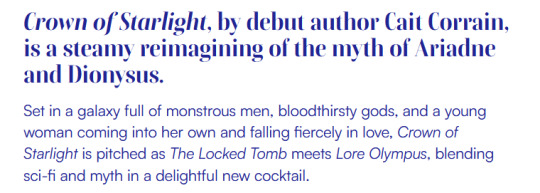

This. This is what the ongoing cultural erasure and white feminist uwu-fication of Greek myth is doing to the literary zeitgeist surrounding Greek myth as a whole. This is why we criticize Lore Olympus and works like it that are created by disingenuous people who only seek to use the assets of Greek myth material as a way to shoot themselves up into fame and stardom. This is why we demand better standards in the literature and webcomic industry, so that people like Rachel and Cait can't use their privileges to quite literally erase the source material that they used to make themselves famous in the first place.
If anything, Cait's actions didn't just affect the people she negatively review bombed, or the people she was affiliated with, but also the people she positively reviewed. While I don't support what Rachel creates, she wasn't the only one who Cait went out of her way to review positively from her alt accounts, there were many others as evident in the Google Doc - but all this really does is tarnish the legitimacy of these books and their ratings by artificially jacking up their numbers that are advertised to others.
Making Greek myth fanfiction or fun creative retellings was never the problem, but it's now being sabotaged alongside so many other genres and mediums by toxic white individuals who can't even keep themselves from committing hate crimes, let alone create something purely for entertainment that's transparent in its illegitimacy, lest it destroy the illusion that these people are qualified to speak over those whose voices are being stifled, often by these very same people. Many of these writers get caught and are still allowed to continue what they're doing - that was certainly what we feared with Cait.
Until today.
It was revealed today that Cait's book will no longer be featured in the Illumicrate May 2024 box.
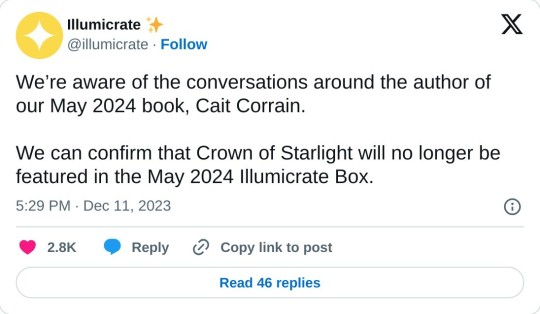
Del Rey has dropped Crown of Starlight from their publishing schedule.
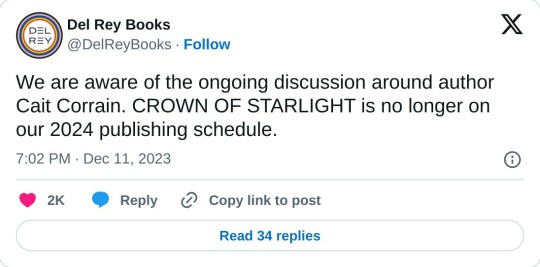
Daphne Press will be hopefully following suit.
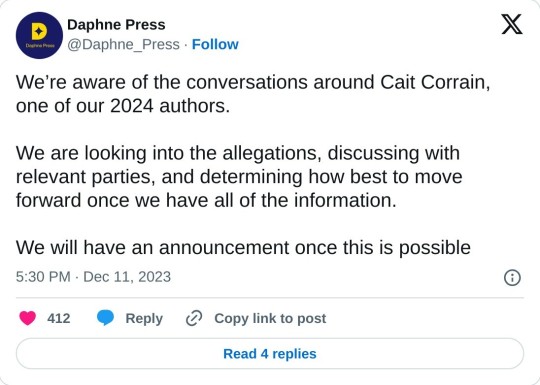
And, most telling of all, Cait's own agent has severed ties with her.
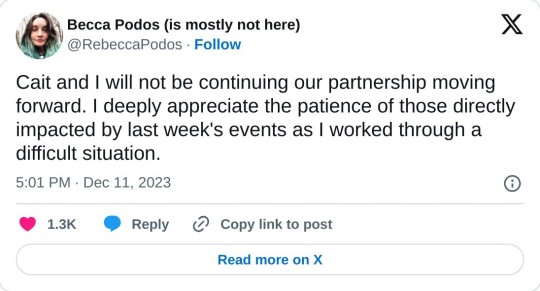
For anyone not familiar with the inner workings of the publishing industry, Cait has essentially been blacklisted. Without an agent or a publishing house, she'll have to entirely rely on her own resources through self-publishing. Unless she manages to sneak her way back in under an alias (which I wouldn't put it past her to try) she no longer has access to the mainstream publishing industry that was already guaranteed for her before she let her 'jealousy' get the better of her.
Her career was already made for her. She had a red carpet laid out for her debut. Her book was getting good pre-reviews and she had quite literally nothing keeping her from her success. The best thing she could have done was nothing. Somewhere in her head, she made up a threat that didn't exist, and sealed her fate in acting on it, a self-fulfilling prophecy.
I think in these situations such as with Cait Corrain, Rachel Smythe, and - also recently and relevant - James Somerton, we need to become increasingly aware of how white voices are still overpowering POC voices, not just in their actions, but in the opportunities they're given over others which they then use to further stifle the voices of those they feel "threatened" by or feel entitled to speak over. While neither James nor Rachel have used sock puppet accounts to "take out the competition" (at least as far as we know lmao) James did quite literally steal the words and voices of queer writers who were deserving of their time in the spotlight, and Rachel's work is being quoted as "rewriting Greek myth" as if its blatant gentrification and appropriation should be marketed as some sort of positive.
It's all too common for these deeply-rooted prejudices to rear their ugly heads and for the people who carry them to act out in this way while justifying it as "jealousy" or "a mistake". This isn't jealousy. This isn't a mistake. This isn't someone "starting drama". This is genuine, targeted hate, with the intention of snuffing out the voices of others who should be empowered, not silenced.
All that time and effort, and for what? Racism and petty jealousy? It just goes to show, it doesn't matter how many opportunities you're given, how high up on the ladder you already are - it won't fix the deeply-rooted insecurity and racial pettiness that spurs people on to do such horrible things.
I've spent enough of my time and words today talking about Cait, and James, and Rachel. So to end this off, I want to join in with all the others who have highlighted the books that were review-bombed by Cait, and help in uplifting them so they can have successful debuts. I'll be pre-ordering a few of them, so I'll be happy to make dedicated posts for them in the future after they release. Please consider purchasing them for yourself if you want some new reading material <3
The Poisons We Drink by Bethany Baptiste:
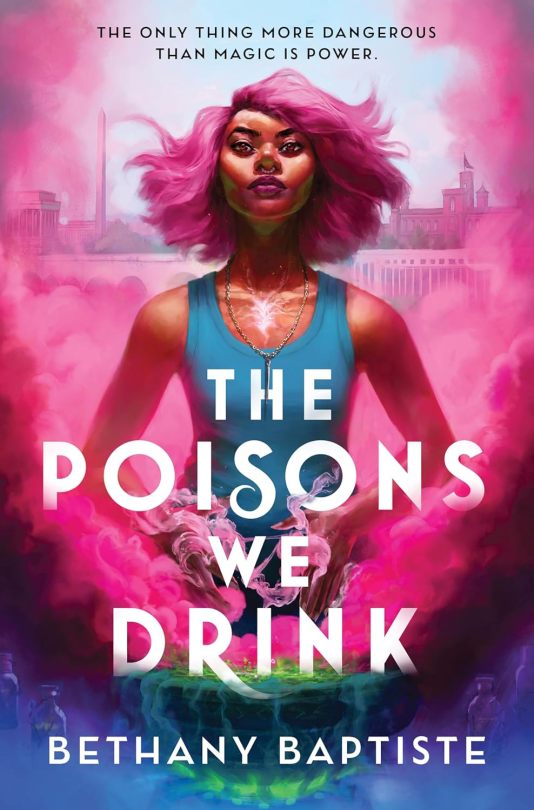
So Let Them Burn by Kamilah Cole:
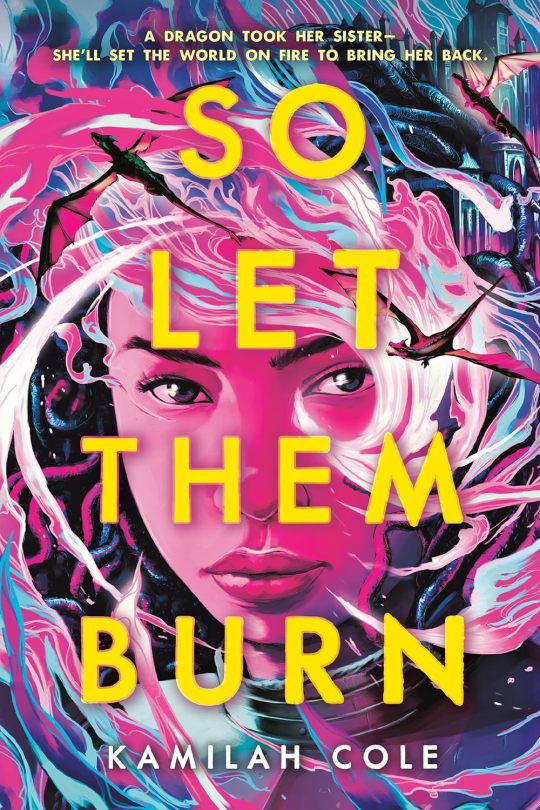
To Gaze Upon Wicked Gods by Molly X Chang:
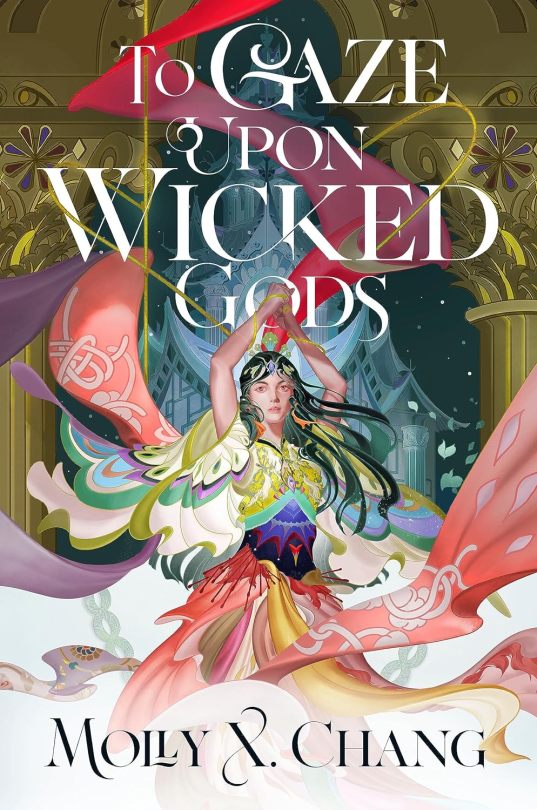
Mistress of Lies by K.M. Enright
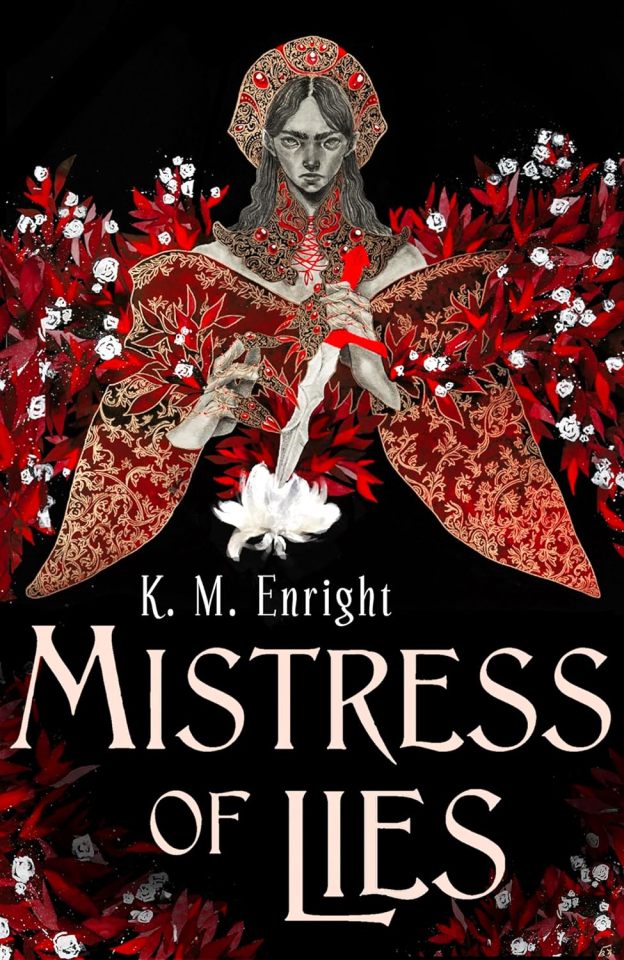
Voyage of the Damned by Frances White:
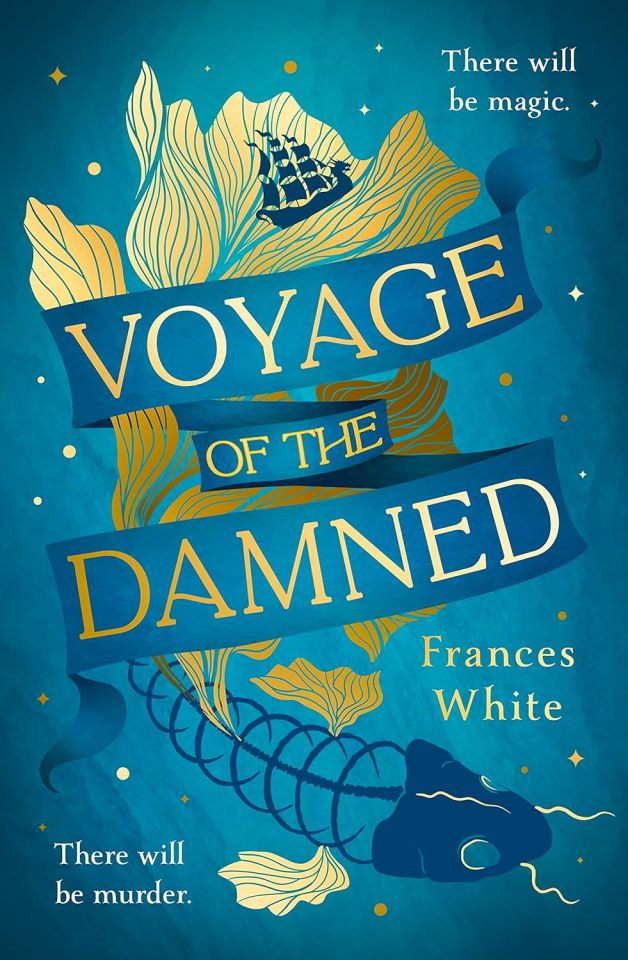
(I'm sure there are plenty others so if I missed any here, please let me know so I can add them here and check out their books!)
If there's any silver lining to this, I hope that it makes people aware of the media they consume and who it's being created by. I hope it makes people more willing to seek out the books that aren't getting the same opportunities as Cait Corrain and Rachel Smythe. I hope it's a wake-up call to the industry that matters like this need to be taken seriously and that POC writers are still being silenced under their own noses. And most of all, I hope it's a reminder that we shouldn't even need at this point that this behavior is not okay, no matter what level a person climbs to - that just because someone is part of one minority doesn't mean they're not capable of sabotaging another. It sucks that that has to be said, it sucks that despite these groups being so intersectional there are still people within them who submit to their deeply-rooted insecurities and find ways to feel threatened that they use to justify hateful behavior.
Having a platform is a privilege. It should never be weaponized against your own peers or those who you simply feel "threatened" by for no reason beyond your own imposter syndrome or doubts or internal struggles. Because as much as you may feel like you've earned where you are, that never gives you the right to weaponize your opportunities against others who were never given those same opportunities in the first place. "Feminism" is not using your power to crush "other women". "Progressiveness" is not exclusive to the progress that only benefits you.
I wish only the best to those who were affected by the actions of Cait Corrain. You deserve to be heard and seen and appreciated for the work you do and the abuse you've had to tolerate. I look forward to your debuts in 2024 <3
650 notes
·
View notes
Text
Fantasy Guide to Ambassadors
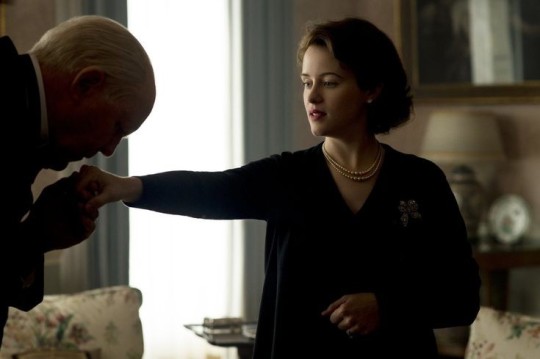
How do different kingdoms negotiate when there aren't any phones or Microsoft Teams available? How can one government let another government how they feel? How can one monarch deliver an insult or compliment to another? Ambassadors, of course.
The Role of Ambassadors

Ambassadors are representatives of a government or monarchy who live in another country and communicates with their host nation on behalf of their own country. Ambassadors are there to make sure that their country's needs are met and that their host nation remains a friend - or at least they are there to remind the host nation of why it's a good idea to be friends.
Ambassadors tend to act as eyes and ears of their government/monarch, reporting back on all the goings on in the country they have been assigned. They can tell their boss the local tea, what the political climate of their host nation, who meets with the head of state and who doesn't. The Ambassador is there to pass on messages from their master and receive messages directly from the opposing head of state.
How to Ambassador Successfully & Not Start a War
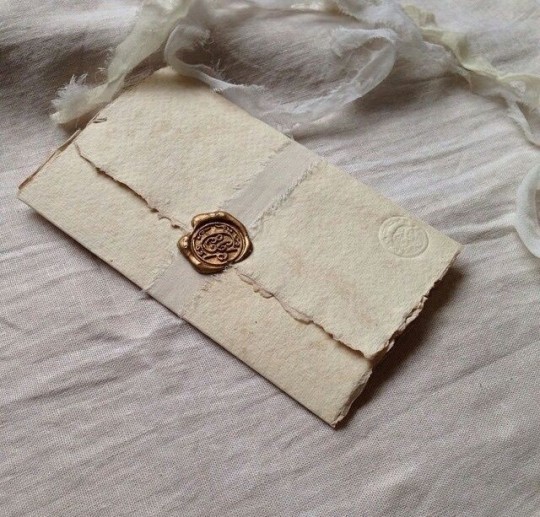
The Ambassador must at all times be respectful toward their host nation. They must abide by their customs, behave themselves, act always in a professional manner and guard the information they handle with care and their lives. Ambassadors are welcomed into the country with a private audience with the head of state, wherein their references are accepted and their role is formally acknowledged. After this, they may only approach the government or monarch by appointment or after being summoned. Their boss would communicate their wishes and words to them and it would be up to the Ambassador to pass these things along, albeit more skillfully and more diplomatically.
The Perks of Being an Ambassador

Ambassadors can live at an official residence called an embassy like today or they can reside at court. They can take their families with them if they choose and are usually paid to establish a good sized household. Ambassadors are usually rewarded with honours and titles, if they are successful in their post or after a long posting. Ambassadors can also be awarded orders and honours by their host, along with places of honour for their family if they reside within them.
Ambassadors are usually welcomed and treated with great respect (if their country is an enemy, they are still treated well in hopes that things don't esculate). Ambassadors are invited to most important gatherings, included in the celebrations at court and spend much of their time at society events (i.e. intelligence gathering). Ambassadors can also get rich on their work, they could sell out their country's secrets to their host nation or even accept bribes to pass on false information to the boss.
The Downsides of Being an Ambassador

Ambassadors do have to leave their homeland for their job, this can mean a long posting away from family and from their own people. Ambassadors can be blamed for rifts or bungled international relations. They may even be accused of taking bribes or being corrupted. Ambassadors could also face being spied on, particularly in a nation that is hostile to their nation. Ambassadors can also be the target of violence from their country's enemies or the focus of emnity by the host nation itself. Very often in times of war of political turmoil, an Ambassador can be expelled from the country. When you're the symbol of a nation and you're in reach of enemies, you are in considerable danger (though it's not recommended to kill an ambassador, it's sort of against the rules).
Who can be an Ambassador?

Ambassadors are usually found amongst the nobility or within government. They are usually chosen by:
Pedigree: The better kind of person you send would mean a bigger compliment to the people the country want to make an ally. Sending a Duke would be a great compliment while sending a simple government official might be seen as an insult. To offer somebody high-ranking is to signal you trust the nation.
Skills: Communication skills are key. Knowledge of the languages and customs of the nation are required. Any ability for espionage, good social skills and a likeabilty would be recommended too.
Political Affiliation: Ambassadors are mouthpieces for their masters. It is generally smart to chose somebody who shares or endorses your view on politics. For example, you wouldn't send an Ambassador hungry for war to a nation you want to make peace with.
Loyalty and Uncorruptability: If you're picking somebody to speak for you and handle very sensitive information, you will chose somebody loyal to you and somebody you trust not to be led astray by the other nation or spies.
2K notes
·
View notes
Text
Beyond the Word Count: A Book Editor's Guide to Writing a First Draft

Every year, we’re lucky to have great sponsors for our nonprofit events. First Draft Pro, a 2023 NaNoWriMo sponsor, is a beautifully designed writing app for fiction writers. Today, they've partnered with Kelly Norwood-Young, former book editor for Pan Macmillan and Penguin Random House, to bring you some pro tips on writing your first draft:
In my career as a book editor, I’ve reviewed hundreds of manuscripts. I've seen the joy of authors creating compelling tales, but also how disheartening it can be to rewrite a disjointed story. I’m here to give you some strategies to address common pitfalls so that you not only reach your NaNoWriMo goal, but also lay the groundwork for a manuscript that truly deserves to be called a gripping novel.
1. Have a plan.
Even if you’re more of a ‘pantser’ than a ‘planner’, it's really helpful to have an outline. I have two favourite approaches for this: the structure-first approach, and what I call the ‘Phoebe Waller-Bridge approach’.
The structure-first approach
There are a lot of narrative frameworks for story structure, but the most foundational in Western fiction is the three-act structure. Here’s a handy guide that breaks each of the classical three acts into a day-by-day guide to NaNoWriMo:
8-day guide to Act 1
14-day guide to Act 2
8-day guide to Act 3
The Phoebe Waller-Bridge approach
I love this quote from Phoebe Waller-Bridge: ‘I’ve never thought structure first. I’ve always thought material first, jokes first, character first ... But knowing the end really helps. Then you just go as far away from the end emotionally as you possibly can.’
Sketch out your major story arcs, your character’s desires and conflicts, and the world they inhabit. The more you know your story's world and inhabitants, the less you'll stray into scenes that lack purpose or create plot and character inconsistencies.
2. Keep the story moving.
Each word needs to propel your story forward. Superfluous details or tangents that don’t serve the narrative stall the momentum you’re trying to generate for your reader.
There’s a trick you can use to move your story forward, called the question of reversibility. Ask yourself: How difficult would it be for my character to reverse their decision? The harder it would be for them to turn back, the more you’ve moved the plot forward.
3. Plant clues carefully.
Plant important elements early and make sure every element, however subtle, serves a purpose (i.e. Chekhov’s Gun).
Be sure to set up necessary components for your climax so that you can steer clear of Deus ex Machina (having that strong outline will help you here), and avoid red herrings unless they serve a clear, meaningful purpose (e.g. you’re writing a mystery and your readers expect some false leads). Misleading your readers without a payoff can erode their trust.
4. Write for the reader, not yourself.
‘There is only one thing you write for yourself, and that is a shopping list,’ insists Umberto Eco in On Literature. Even if writing, for you, is a therapeutic outlet, a form of self-expression, or a way to leave a legacy, you’re still writing to say something to someone else. Your story simply won’t be as strong if you forget your reader’s perspective.
5. Keep daily editorial notes for your future self.
While editing should wait until at least December, end each day with a brief reflection, noting any off-course deviations, potential inconsistencies, areas to research further, or moments of inspiration to revisit when you start editing.
These daily notes will be invaluable during the editing process, helping you to remember insights that are no longer fresh when you come back to the manuscript later.
6. Embrace the first-draft mentality.
There’s a lot you can do to ensure that your first draft is the best it can be before the end of November—but just as important is to understand that all first drafts have flaws.
As a book editor, I've witnessed manuscripts transform, sometimes unrecognizably, from their first drafts. Embrace the uncertainty and creative detours—because it's from this beautiful chaos that your story will find its true voice.
Kelly Norwood-Young is a seasoned book editor and proofreader with comprehensive experience across various facets of manuscript editing. Her background includes roles at Pan Macmillan and Penguin Books, extending into a successful freelance career working with award-winning authors. Kelly's work, known for its precision and sensitivity to the author's voice, has been integral to the success of both new and established writers globally.
Try out First Draft Pro: All NaNoWriMo participants can use the discount code NANOWRIMO2023 for 20% off a premium subscription to First Draft Pro! Offer expires January 31, 2024.
359 notes
·
View notes
Text
How to Start a Story Idea
Tackling a whole 50,000+ word novel can be a lot. Here are some ways to break down the process to make it a little more digestible.
Choose, research, and enjoy your story's setting. Whether this is a fantasy realm, a lost planet, or a small suburban town, know and research where your story takes place. Think about the time period, cultural details, geography, the laws/rules, etc. This is a world where the reader will be spending hours, so make sure it's immersive.
Place your protagonist in the world and give them a story. You could have the most detailed fantasy world, but that means nothing without a story or character to explore it. Create a compelling main character and give them a story that progresses them throughout the world you created.
Find your story's theme. A well-rounded story will revolve around a theme or central idea. Some themes include survival, love, good vs. evil, death, war, forgiveness, etc. What do you want to teach your readers or leave them with once the novel is finished? Do you want them to know that forgiveness is important? That war creates wounds only love can heal? That beauty is in the eye of the beholder? Weave these themes and lessons into your plot and story.
Create a cast. Build your protagonist friends and foes that support or challenge them on their journey. Give some of these characters their own arcs/side plots to thicken your story. There are a bunch of character types that you could add to your story such as the love interest, a mentor, an antagonist, minor characters, etc.
Divide your novel into acts. Once you know the big picture of the story you want to tell, break it up into acts. There are three main acts of a traditional story: Acts I, II, and III. Look up and consider following the Three-Act Structure to give your story a fluid motion of beginning, middle, and end.
Know your ending. The ending is the final part that your readers digest, meaning that it will likely stick with them. You don't have to fully understand how your novel will end, but having somewhat of a plan is important. This way... when you write, you're writing towards something.
Instagram: coffeebeanwriting
2K notes
·
View notes
Text
How to Write a Pirate Character | Fast, But Long Guide
Arr, mateys! Are you ready to set sail on a new writing adventure? (Sorry if that was cringe lol) Whether you're a seasoned writer or just starting out, creating a convincing pirate character can be a fun and challenging task. Pirates have been a popular trope in literature and media for centuries, but how do you make your pirate character stand out from the rest?
In this post, I'll help you explore tips and tricks for crafting a memorable pirate character in your fantasy novel. From subverting common pirate stereotypes to using historical research to inspire your character's backstory, I'll cover everything you need to know to create an authentic and unique pirate protagonist. So hoist the Jolly Roger and let's get started!
Crafting a Convincing Pirate Character for Your Fantasy Novel
Pirates are a popular fantasy trope, with their swashbuckling adventures and brash personalities. However, creating a convincing pirate character for your fantasy novel requires more than just the usual pirate tropes. To make your pirate character unique and memorable, consider the following tips:
Consider the Role of Your Pirate
Before crafting your pirate character, consider their role in your story. Will they be the protagonist or the antagonist? Will they help or hinder the protagonist's journey? Understanding their role can help you create a convincing and well-rounded character.
Create Flaws and Vulnerabilities
Your pirate character should have flaws and vulnerabilities that make them relatable and human. Avoid creating a perfect or infallible character, as this can make them less interesting and memorable. By giving your pirate character weaknesses and challenges to overcome, you create opportunities for character development and growth.
Do Your Research
Crafting a convincing pirate character requires research. While there are many pirate tropes and stereotypes, it's important to avoid clichés and caricatures. Understanding the historical context of piracy and the lives of real-life pirates can provide inspiration for your character's backstory, motivations, and actions.
Subvert Pirate Stereotypes
Pirates are often portrayed with common tropes such as the eye patch, parrot, and peg leg. While these features can be fun and memorable, consider subverting them to create a more unique character. Think outside the box and create a pirate character that breaks from the norm.
By following these tips and taking the time to create a complex and well-rounded pirate character, you can enhance the overall quality of your fantasy novel.
Understanding Pirate Stereotypes and How to Subvert Them
When writing a pirate character, it can be tempting to rely on common stereotypes such as eye patches, parrots, and peg legs. However, it's important to subvert these tropes to create a unique and memorable character.
Common Pirate Stereotypes
Eye patch
Parrot
Peg leg
Cutlass or sword
Grog (alcohol)
Treasure hunting
While these elements are often associated with pirates, they can also be clichéd and overused. Consider how you can subvert these tropes to create a more interesting character.
Pirates Were Not Lawless
Pirates are often portrayed as completely lawless and dangerous, but this is a stereotype. In reality, pirates had strict hierarchies and rules within their crew. For example, the captain of the crew often had the final say in any decision, but crew members were allowed to vote on certain issues. Understanding these rules and hierarchies can add depth to your pirate character.
Historical Context
When creating a pirate character, it's important to consider the historical context of piracy. Pirates were often the product of their environment, forced into piracy due to a lack of opportunities or as a result of war. Consider how your character's motivations, actions and attitudes might be influenced by this context.
Avoid Caricatures
To create a well-rounded, complex pirate character, it's important to avoid relying on clichéd caricatures. Your character should have strengths and weaknesses, as well as unique motivations and goals. A good pirate character will have flaws and vulnerabilities that make them relatable and human.
Researching Historical Pirates to Inspire Your Character
One of the best ways to create a convincing pirate character for your fantasy novel is to research real-life pirates and draw inspiration from their lives. Here are some tips:
Consider the Time Period and Location
Piracy has existed for centuries, so it's important to choose a time period and location that suits your story. Different pirates operated in different areas, and had varying cultures and methods. For example, Blackbeard, one of the most infamous pirates in history, operated in the Caribbean during the early 18th century, while the Barbary pirates focused on raiding ships in the Mediterranean during the 16th to 19th centuries.
Read Primary Sources
Reading primary sources, such as diaries and letters from pirates themselves, can provide valuable insights into their lives and motivations. Some great sources to check out include:
The journal of William Dampier
The biographies of Blackbeard, Anne Bonny, and Calico Jack Rackham
The trial records of pirates who were sentenced to death, which can offer insight into the legal system of the time
The pirate code, which was a set of rules that pirate crews followed. It can give you an idea of the hierarchies and structures within pirate societies.
Get Creative
Don't be afraid to take creative liberties with historical accuracy. Your pirate character can be inspired by real pirates without being an exact replica. Remember, you're writing a fantasy novel, not a history thesis. Use your research to create a unique and believable character with their own backstory, personality, and motivations.
By researching historical pirates, you can create a detailed and convincing pirate character that adds depth and authenticity to your fantasy novel.
Building a Unique Backstory for Your Pirate Character
One of the key elements of creating a memorable pirate character is crafting a unique backstory that explains why they became a pirate and what motivates them to stay one. Here are some tips for building a compelling backstory for your pirate:
Consider Traumatic Events
Perhaps your pirate character experienced a traumatic event, like the loss of a loved one or a betrayal, that led them to a life of piracy. This could provide depth and complexity to their motivations and actions.
Include Personal Relationships
Your pirate's relationships with other characters, such as a mentor or a former crewmate, can also add to their backstory and provide opportunities for conflict or growth.
Think About Career Choices
Did your pirate character choose piracy as a career, or were they forced into it by circumstance? This can affect their relationships with other pirates and how they view their role within the crew.
Incorporate Personality Traits
The personality traits that make your pirate character unique can also be tied to their backstory. For example, a pirate with a quick wit may have developed this skill as a result of surviving on the high seas.
Overall, a well-crafted backstory can provide insights into your pirate character's motivations, personality, and relationships with other characters. Don't be afraid to take risks and explore new ideas to make your pirate truly unforgettable.
Creating Authentic Pirate Dialogue That Still Resonates with Modern Readers
Pirate dialogue can make or break the believability of your character. The key is to strike a balance between authenticity and accessibility, so modern readers can understand what your pirates are saying without losing the pirate lingo that makes them unique. Here are some tips for crafting authentic pirate dialogue:
1. Use Historical Language, But Don't Go Overboard
Research historical pirate slang and language to add realism to your dialogue. However, don't overdo it. Too many unfamiliar words or phrases can confuse modern readers, leading them to lose interest in your story. Instead, sprinkle in some pirate language and mix it with modern speech patterns.
2. Consider Your Pirate's Background and Education
Not all pirates spoke the same, and their backgrounds and education levels will influence how they speak. An educated pirate may use more complex language, while a less-educated one may rely more on slang and swear words. Factor in things like regionality, ethnicity, and class to help inform your pirate's dialogue pattern.
3. Use Research and Imagination to Create Believable Dialogue
It's important to do your research and use historically accurate pirate language when possible. But when in doubt, let your imagination take over. Remember, you're writing fiction, not a historical textbook. As long as your dialogue sounds believable and fits your character, it's okay to take a few creative liberties.
4. Read and Watch Movies Featuring Pirates
Reading books and watching movies featuring pirates can help you get a feel for their typical speech patterns and common phrases. Pay attention to how the dialogue is written and how it adds to the atmosphere of the story. But again, don't be afraid to put your own spin on things. Make your pirates memorable and unique.
By keeping these tips in mind, you can create authentic pirate dialogue that still resonates with modern readers. Remember, the key is to balance historical accuracy with accessibility, so your pirates sound believable and interesting. Don't be afraid to get creative and let your pirate's personality shine through in their dialogue!
Choosing the Right Archetype for Your Pirate Protagonist
Archetypes are useful tools for developing memorable and relatable characters, including pirate protagonists. Consider which archetype best fits your protagonist's personality, motivations, and actions to ensure a cohesive and compelling story.
The Noble Outlaw
This archetype represents a pirate who, despite their criminal actions, adheres to a moral code. The noble outlaw may have been forced into piracy due to circumstances beyond their control, and they may only attack wealthy or corrupt targets. This archetype can create tension with other pirates in the crew who may not share the same moral values.
The Ruthless Captain
As the name implies, the ruthless captain is a pirate who rules their crew with an iron fist. They may have gained their position through violence or intimidation, and they prioritize their own power and wealth above all else. This archetype can create conflict between the captain and other crew members who may question their decisions or motives.
The Swashbuckling Adventurer
This archetype represents a pirate who loves adventure and thrills above all else. They may have joined piracy out of a desire for excitement and freedom, and they may prioritize having fun over accumulating wealth or power. This archetype can create tension with other pirates in the crew who are more focused on practical goals.
Crafting Memorable Supporting Characters to Enhance Your Pirate's Story
While your pirate character may be the main focus of your story, having well-crafted supporting characters can enhance their journey and provide depth to the overall narrative. Here are some tips for creating memorable supporting characters:
Diversity:
Consider including a diverse cast of characters to add contrast and tension to your pirate's story. Having characters with different backgrounds and experiences can also provide opportunities for your pirate to grow and develop.
Motivation:
Your supporting characters should have clear motivations for their actions, whether it's loyalty to the pirate crew or a personal vendetta. Their motivations can also provide opportunities for conflict and plot development.
Backstory:
Similar to your pirate character, your supporting characters should have their own backstory that explains their actions and motivations. A well-developed backstory can also provide opportunities for character growth and plot development.
Opposition:
Having opposing characters can create conflict and tension in your story, providing opportunities for your pirate to overcome challenges and grow as a character. Consider creating characters that have conflicting beliefs or goals with your pirate.
By utilizing these tips, you can create supporting characters that enhance your pirate's story and provide depth to the overall narrative. Remember to give each character their own unique personality and motivations, creating a diverse cast that enhances your story's themes and motifs.
Weaving Pirate Culture and Ethics into Your Story's Themes and Motifs
As you develop your pirate character and plot, it's important to consider the culture and ethics of piracy and how they can influence your story's themes and motifs.
Pirate Ethics
Pirates followed their own moral code, which often included principles such as equality among crew members, democracy in decision-making, and retribution for mistreatment by the authority figures they opposed.
Consider how your pirate's actions and beliefs align with the culture and ethics of piracy. Do they adhere to the code or reject it? Does their compliance or defiance create conflict or resolution in the story?
Pirate Culture
Pirates had their own unique culture, including customs such as dividing loot, flying a specific flag, and using distinct language and slang.
Using pirate culture as a motif can add richness to your story's atmosphere. For example, a treasure hunt can provide opportunities for incorporating pirate customs and traditions while also advancing the plot. A ship battle can showcase the crew's cohesion and strategy.
Exploring Themes
Pirate culture and ethics can provide opportunities for exploring themes such as justice, freedom, and morality. These themes can be emphasized through your pirate character's actions and decisions.
For example, if your pirate character is motivated by a desire for revenge against a corrupt government, this can provide a compelling exploration of the theme of justice. If your pirate character struggles with the decision to betray their crewmates for personal gain, this can delve into the theme of morality.
By weaving pirate culture and ethics into your story, you can provide depth and meaning to your plot and characters.
Conclusion
Writing a convincing pirate character for your fantasy novel requires a mix of creativity, research, and attention to detail. By understanding and subverting common pirate stereotypes, researching historical pirates, developing a strong backstory, crafting authentic dialogue, choosing the right archetype, and creating memorable supporting characters, you can create a pirate character that is unique, complex, and memorable. Weaving pirate culture and ethics into your story's themes and motifs can provide depth and meaning to your plot and characters, and make your pirate character more relatable to modern readers. So set sail on your writing journey, and let your pirate character lead the way!
Copyright © 2023 by Ren T.
TheWriteAdviceForWriters 2023
774 notes
·
View notes


